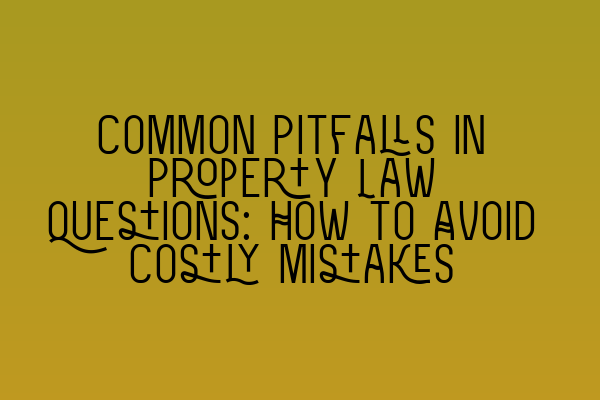Common Pitfalls in Property Law Questions: How to Avoid Costly Mistakes
When it comes to property law, there are numerous complexities and potential pitfalls that can easily lead to costly mistakes. Whether you’re a student studying property law, a legal professional, or an individual dealing with a property issue, it’s important to be aware of these common pitfalls and take steps to avoid them. In this blog post, we’ll discuss some of the most common pitfalls in property law questions and provide insights on how to avoid making costly mistakes.
1. Failing to Understand Property Rights and Interests
One of the fundamental aspects of property law is understanding the various rights and interests that individuals can have in a property. It’s crucial to have a clear understanding of concepts such as freehold, leasehold, easements, and covenants. Failure to grasp these concepts can lead to misunderstandings and errors when analyzing property law questions.
To deepen your understanding of property rights and interests, consider reviewing our comprehensive guide on Property Rights and Interests: A Complete Overview. This guide provides in-depth explanations and practical examples to enhance your knowledge in this area.
2. Neglecting the Importance of Contract Law
Property transactions often involve contracts, and failing to consider the impact of contract law can be a costly mistake. It’s essential to understand the key elements of a contract, such as offer, acceptance, consideration, and intention to create legal relations. Additionally, being aware of potential issues such as misrepresentation and breach of contract is crucial for avoiding pitfalls in property law questions.
To test your knowledge of contract law, take advantage of our Interactive SQE Mock Tests for Contract Law. These tests provide a realistic simulation of the SQE contract law exam, allowing you to assess your understanding and identify areas for improvement.
3. Overlooking Land Registration Requirements
Another common pitfall in property law questions involves overlooking land registration requirements. Failure to comply with the necessary registration processes can have severe consequences, including the invalidation of property transactions. It’s essential to understand the Land Registration Act 2002 and the requirements for registering property transactions, obtaining official copies of title documents, and conducting proper searches.
To expand your knowledge on land registration, consider joining our upcoming SQE Property Law Webinars. These webinars feature expert insights and guidance on various topics, including land registration, and provide an opportunity to ask questions and interact with legal professionals in the field.
4. Misunderstanding the Law of Mortgages
Property transactions often involve mortgages, and a common pitfall in property law questions is misunderstanding the law surrounding mortgages. It’s crucial to understand the legal rights and responsibilities of both borrowers and lenders, as well as the implications of mortgage defaults and foreclosure proceedings. Failing to grasp these concepts can lead to costly mistakes and legal disputes.
To gain a comprehensive understanding of the law of mortgages, explore our detailed article on The Law of Mortgages: A Comprehensive Guide. This guide provides a thorough analysis of mortgage law, including key legal principles and practical examples.
5. Neglecting the Importance of Landlord and Tenant Law
For those dealing with residential or commercial property matters, neglecting the importance of landlord and tenant law can be a significant pitfall. Understanding the rights and obligations of both parties, as well as the statutory protections in place for tenants, is crucial for avoiding costly mistakes and legal disputes. It’s essential to be aware of topics such as tenancy agreements, rent arrears, eviction procedures, and repairs and maintenance obligations.
To deepen your knowledge of landlord and tenant law, refer to our comprehensive guide on Landlord and Tenant Law: A Complete Overview. This guide provides detailed explanations and practical insights into this vital area of property law.
In conclusion, property law questions can be complex, and it’s important to navigate them carefully to avoid costly mistakes. By understanding property rights and interests, considering the impact of contract law, complying with land registration requirements, comprehending the law of mortgages, and recognizing the importance of landlord and tenant law, you can minimize the risk of errors and ensure a successful outcome in your property law matters.
To stay updated with the latest legal developments and gain expert insights, consider joining our SQE Property Law Webinars. Additionally, take advantage of our Interactive SQE Mock Tests for Contract Law to test your knowledge and enhance your exam preparation.
Remember, when it comes to property law, knowledge and attention to detail are key for avoiding costly pitfalls and achieving positive outcomes.
